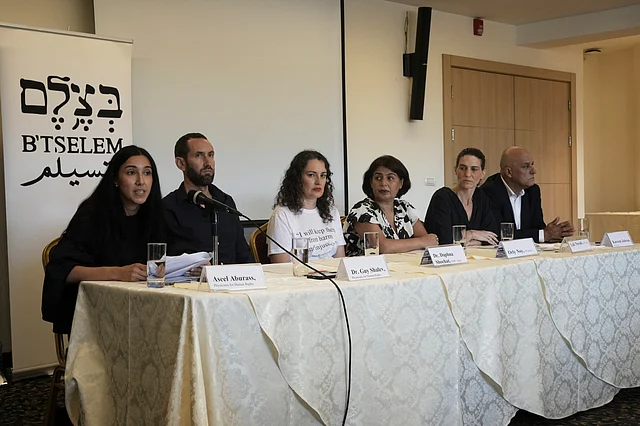World
Israeli Rights Groups Accuse Government of Genocide in Gaza

Two prominent Israeli human rights organizations, B’Tselem and Physicians for Human Rights-Israel, have publicly accused the Israeli government of committing genocide in Gaza. This declaration marks a significant moment, as it is the first time local Jewish-led groups have made such claims during nearly 22 months of conflict, igniting a contentious debate within Israeli society and beyond.
The accusations come in the wake of Israel’s military offensive in Gaza, initiated after Hamas’ deadly attack on October 7, 2023. While Palestinians and international human rights advocates have made similar claims, the allegations from these two Israeli organizations challenge a deep-seated national taboo against equating Israeli military actions with genocide. In a nation established in the aftermath of the Holocaust, such accusations are particularly sensitive.
Shifting Perspectives on Military Conduct
Guy Shalev, the director of Physicians for Human Rights-Israel, expressed that many in the Jewish-Israeli public dismiss allegations of genocide as biased or antisemitic. “Perhaps human rights groups based in Israel, and coming to this conclusion, is a way to confront that accusation and get people to acknowledge the reality,” he noted.
Despite these serious allegations, the Israeli government maintains that its military actions are a legitimate response to an existential threat posed by Hamas. Israeli officials have rejected the genocide claims, characterizing them as antisemitic and arguing that civilian casualties in Gaza are consequences of Hamas using civilians as human shields.
International scrutiny is intensifying, with the International Court of Justice currently hearing a case filed by South Africa alleging genocide against Israel. Notably, both Prime Minister Benjamin Netanyahu and former Defense Minister Yoav Gallant face international arrest warrants related to accusations of war crimes in Gaza.
Documenting the Humanitarian Crisis
The reports from B’Tselem and Physicians for Human Rights-Israel detail the systematic dismantling of Gaza’s health infrastructure, claiming that Israeli policies and military strategies have created conditions that threaten the survival of the Palestinian population. They reference reports from other international human rights organizations, including Human Rights Watch and Amnesty International, which have echoed similar concerns.
The organizations assert that repeated statements from Israeli officials advocating for the total destruction of Palestinian society, combined with on-the-ground policies, illustrate an intention to destroy the Palestinian population. Their findings are based on eyewitness testimonies, documents, and consultations with legal experts, as they have been unable to access Gaza during the ongoing conflict.
Shalev emphasized the painful nature of these conclusions, particularly as a descendant of Holocaust survivors. “As the grandson of a Holocaust survivor, it’s very painful for me to be reaching this conclusion,” he remarked, indicating the weight of historical memory in shaping perceptions of genocide.
Public discourse in Israel has often focused on political leadership rather than the humanitarian implications of military strategy. Criticism has been predominantly directed at Netanyahu’s wartime decision-making, particularly concerning the hostage situation, with around 50 individuals still held by Hamas.
Some Israeli historians, such as Tom Segev, question whether these new allegations will resonate with the public. “The major thing for Israelis is a question of the hostages, not necessarily the fate of the population in Gaza,” he stated.
Calls for Accountability and Action
Both B’Tselem and Physicians for Human Rights-Israel are urging the international community to take action to protect Palestinians. They emphasize the obligation to speak truthfully about the situation and to advocate for those suffering in Gaza. “We have an obligation to do everything we can to speak the truth about this, to stand by the victims,” stated Sarit Michaeli, the international director for B’Tselem.
As the situation continues to evolve, the implications of these accusations resonate deeply within Israel and the broader international community. The ongoing conflict has not only resulted in significant human loss but has also raised profound questions about morality, justice, and the responsibilities of nations in times of war.
-

 World5 months ago
World5 months agoSBI Announces QIP Floor Price at ₹811.05 Per Share
-

 Lifestyle5 months ago
Lifestyle5 months agoCept Unveils ₹3.1 Crore Urban Mobility Plan for Sustainable Growth
-

 Science4 months ago
Science4 months agoNew Blood Group Discovered in South Indian Woman at Rotary Centre
-

 World5 months ago
World5 months agoTorrential Rains Cause Flash Flooding in New York and New Jersey
-

 Top Stories5 months ago
Top Stories5 months agoKonkani Cultural Organisation to Host Pearl Jubilee in Abu Dhabi
-

 Sports4 months ago
Sports4 months agoBroad Advocates for Bowling Change Ahead of Final Test Against India
-

 Science5 months ago
Science5 months agoNothing Headphone 1 Review: A Bold Contender in Audio Design
-

 Top Stories5 months ago
Top Stories5 months agoAir India Crash Investigation Highlights Boeing Fuel Switch Concerns
-

 Business5 months ago
Business5 months agoIndian Stock Market Rebounds: Sensex and Nifty Rise After Four-Day Decline
-

 Sports4 months ago
Sports4 months agoCristian Totti Retires at 19: Pressure of Fame Takes Toll
-

 Politics5 months ago
Politics5 months agoAbandoned Doberman Finds New Home After Journey to Prague
-

 Top Stories5 months ago
Top Stories5 months agoPatna Bank Manager Abhishek Varun Found Dead in Well









